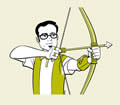
listen to Joe's Hotdogs Compelling Elevator Speech site map + links |
|
|
| |
Joe's Hotdogs
by Glenn R Harrington
Complete Transcript
The Joe's Hotdogs story has two parts.
The first part consists of a little journey along a beach, an exploration of thoughts and feelings on the discovery of Joe’s Hotdogs on this walk along the beach.
The second part of the Joe’s Hotdogs story is further exploration of those thoughts and feelings and their business implications. They are business concepts applicable in many different types of businesses serving many different markets.
So, you are taking a walk along a beach, let’s say on Vancouver Island, Canada. As you walk along the beach, you notice a bluff to your left and the ocean to your right. On top of the bluff, there is a sign that says "Joe’s Hotdogs".
You are not really looking for a place to eat, but the Joe’s Hotdogs sign has come to your attention. You decide, "I’ve already had my breakfast and I’m not hungry for lunch yet. I’m here for a beach walk, not to eat. Besides, I don’t feel like eating a hot dog."
As you walk along the beach, you begin to think to yourself, "If I were to order something from Joe’s Hotdogs what would I order?" Well, you might want a hotdog, you might want a footlong, you might want a veggie dog, or you might want a smokie. (I don’t know exactly what a smokie is, but it seems to be the kind of thing people buy from hotdog stands).
Well, you'd probably want a beverage with it. Maybe you are a coffee drinker, or a tea drinker, or an iced tea drinker. Maybe you'd prefer some kind of pop or juice. Would you like fries with that, or would you like onion rings? If you ordered a hotdog, maybe a veggie dog or a footlong, which garnishes would you put on your dog? Maybe you like pickles or relish. Maybe you like a particular variety of mustard. All these things rest in your mind as you walk along the beach.
Then, you notice a sign saying “This way up.” It doesn’t specifically say, "Joe's Hotdogs, this way", but you noticed that Joe‘s Hotdogs is on top of the bluff, and the path leading upward seems to be a fairly well-worn path. You see some people up there, and since the beach looks pretty much the same ahead of you as it does behind you, out of curiosity you walk the path up the bluff and you discover that there is a dozen or so people standing around this little hotdog stand that looks sort of like a little hut overlooking the ocean.
People are enjoying all types of hot dogs and drinks: different sodas and colas, different types and sizes of hotdogs with different garnishes on them. Some people are eating onion rings, some are having french fries, and you happen to notice that there are some people ordering french fries only. There seems to be some enthusiasm for the french-fries at Joe’s Hotdogs.
So, even though you just decided a few minutes ago, on your walk along the beach, that you really didn’t want anything from Joe’s Hotdogs, here you are, having climbed up the path on the bluff along with a bunch of people who seem to be enjoying themselves, and you’re curious. “Well gosh, maybe Joe’s Hotdogs’ french fries would be good, even though I have already had my breakfast and I am not all that hungry for lunch. Maybe I should try Joe’s Hotdogs because I might want to come back some other time and I'll need to know if the hotdogs are worth the climb up that steep path.”
So, you step up to Joe’s Hotdogs counter and you order some french fries. You notice a sign saying that they have homemade relish from locally grown cucumbers. You think to yourself, “I like relish on hotdogs. Let me look at the rest of these condiments.” You also notice that they have a variety of different buns. Because of all the enthusiasm for the french fries, you order some with a dog and the homemade relish from the locally-grown cucumber, and of course, you order a beverage.
You end up spending ten dollars at a place where you had already decided you didn’t even want to go. There you are, standing there spending ten dollars.
You sit down to eat your food and you notice that there is somebody else coming up the bluff, just as you did, from the beach. They are just standing there checking it out, and you notice that person might be doing the exact same thing you just did: coming up the bluff out of curiosity. By golly, maybe that person is going to spend ten dollars trying out Joe’s Hotdogs, even though they don’t have an appetite - just like you.
You dig into your french fries and your veggie dog with the homemade relish. You resolve to yourself, “I am going to remember this place. I’m going to come back. I might tell my friends or bring family.” So, you bought a meal that you hadn't intended to, but hey, the service at Joe’s Hotdogs seems to be friendly, they seem to have happy people, there is enthusiasm for the fries, and you feel like you have really discovered something good. You are glad you made the hike up the bluff to Joe’s Hotdogs.
So that’s the story about the discovery of Joe’s Hotdogs.
Let me share with you, now, some lessons built into that story, which apply to a variety of businesses in a variety of situations. Not just hotdog stands, and not just businesses on Vancouver Island.
Well, first of all, there is encountering the concept: Joe’s Hotdogs.
As you were walking along the beach, you started running through your mind what your order might be, even though you had already decided that you didn’t want a hotdog. You thought of the possibility of foot longs, veggie dogs, and smokies, even though you don't know what smokies exactly are. You ran through a bunch of possibilities as to what their core service or core product was. The sign just said Joe’s Hotdogs.
Heck, you don’t even know if there is somebody named Joe who works there. Maybe it’s a man named Joseph. Maybe it’s a woman named Joesphine or Joanne. It doesn’t matter. The name Joe’s Hotdogs brought to your mind a whole line of hotdog-type products.
Most people in our culture assume that where you can buy french fries, you can buy coffee, tea, iced tea, juices, and various types of pop. These things can be assumed in our culture from a place named "Joe’s Hotdogs". What would Joanne’s Handbags do?
The sign saying “this way up” was all that you needed to go up to Joe’s Hotdogs. There didn’t have to be someone standing there waving you up the bluff. There didn’t have to be a sign saying ‘Happy Hour discounts until such-and-such a time’. There didn’t have to be any incentive for you to go to Joe’s Hotdogs and order your ten-to-twelve dollars worth of food – other than your own curiosity about the Joe’s Hotdog experience. So, “this way up” was all you needed to interrupt your wonderful walk, along the beach on Vancouver Island, and go to check it out.
The sign only had to say Joe’s Hotdogs to bring to mind a whole menu. Which turned out to be much more various than just hot dogs. You didn’t need any incentive other than your interest in the Joe’s Hotdogs experience.
All Joe’s Hotdogs needed was a sign for you to know that he or she is there; all you need to know is the way to find Joe’s Hotdogs. Specifically, this is the path up the bluff to go find him. No flashing lights. No people waving you in unnecessarily. This may go to show you that sometimes coupons and "Sale Ends Friday" or other kinds of buyer incentives are extrinsic motivations that people don’t need, because, if they are intrinsically motivated to explore your business, or to check you out, then they don’t need extrinsic motivations.
Extrinsic motivation is never heartfelt. Loyalty is.
Many companies use discounts and "Sale Ends Friday!" tactics, and other extrinsic motivations, to get people to spend money with them unnecessarily. In fact, sometimes it is a little bit too much. People are often turned off by "Sale Ends Friday!" and things of that nature.
Somebody’s own hunger, by the way, is a great way to sell food.
Once you get up there, you see other people – other people apparently enjoying themselves. That’s a sign.
Sometimes, all you need is to see or to know that there are other people like you (sometimes not like you) who are enjoying an experience – so much that you become interested in trying that experience. All that many consumers need to know is that there are third parties interested in what the seller offers, rather than being persuaded that they themselves should be the pioneer to try out the product.
Another lesson to learn from this story is that, sometimes, authenticity and uniqueness are themselves strong selling points. Homemade relish from locally-grown cucumbers might be all that some people need to get them to order a hotdog.
The relish isn’t necessarily claimed to be the best relish in the world, and it isn't necessarily award-winning relish, and nobody ever said that locally grown cucumbers are anything special. However, the novelty or uniqueness of homemade relish from locally-grown cucumbers is a draw for some folks. Authenticity is, generally, a draw for business. People like to buy the real thing.
If you can present what you are offering as the real thing, authentic or heritage or, in some way or another, attractive because of its novelty or specialness, then you do not need to convince the buyer that it is the best relish, or the best anything else, or that it is the cheapest. You don’t have to offer a guarantee or a warranty in some cases. Just the idea that it's authentic, that it's original, is enough.
I didn’t mention that the relish was good, but you ordered a hotdog, didn’t you? A veggie dog, that is. You read that the relish was homemade, which has an air of authenticity about it, and locally grown cucumbers sound like something special, too.
You ordered french fries because other people seemed to be enjoying them. The truth is (I can make up the truth because this is my story.) Joe’s Hotdogs sells more french-fries than anyone else on Vancouver Island.
Yes, there is quite a few eateries, restaurants, and lots of hotels on Vancouver Island. Indeed, it is a place where many a french fry is fried. Joe’s Hotdogs, however, happens to sell more french fries than anyone else. And you know what? That’s because their french fries are good, and because the total experience of Joe’s Hotdogs, including the ocean view, is a positive one.
It doesn’t necessarily mean that Joe’s Hotdogs’ french fries are the best french-fries in the world. Therefore, it is not a smart idea to assume that, if you have the best X Y or Z product, that the world owes you big volume.
Sometimes, having the best does not translate to having the most profitable or the busiest business.
Joe’s Hotdogs sells more french-fries because the french-fries are part of a whole package. Their french fries do happen to be very good. Maybe they’re the best. Maybe they are not the best, but they are very good french fries, served by friendly people with an ocean view, and you can get a hotdog with homemade relish made from locally-grown cucumbers. Those french fries, as part of that whole Joe’s Hotdogs experience, happen to be the best selling french fries on the island.
Something else that is important is that the Joe’s Hotdogs sign says “Joe’s Hotdogs”. The sign does not say, “Joe’s Hotdogs, with the best selling french fries since 1976.” Nor does it say, “Joe's Hotdogs. Get your favourite coffee!” It does not say, “Joe’s Hotdogs. Come here for pop.” It does not say, “Joe’s Hotdogs. Come here for home-grown, homemade relish.” It just says, "Joe’s Hotdogs".
One of the lessons that come from that is that Joe’s Hotdogs’ reputation, through its name at least, is a simple one. The Joe’s Hotdogs name carries with it the cultural assumption that there are probably beverages. There are probably onion rings and french fries. There might even be such things as homemade relish.
How does the name Joe’s Hotdogs imply that there might be homemade relish? Well, it doesn’t say McDonald's. People know that McDonald's does not offer homemade relish.
The name Joe suggests something that might not be true about Joe's: There is an individual named Joe, Joanne, Joseph, Josephine. Who’s to say who it is? Often a name carries enough implications that no one has to say “Joe’s Hotdogs with homemade relish” or “Joe’s Hotdogs - We have great french fries.” The name Joe’s Hotdogs not only implies Joe's menu, but also, it implies the possibility of homemade relish more than the name Holiday Inn might, or more than the name U-Haul might.
So, a company name is important in ways that are subtle.
Now, sometimes people bank on or have strong expectations for their name. For example, "Why doesn’t the whole world read my mind? Don’t they realize that I have the best homemade relish?" These are unwise assumptions.
However, it is also unwise to name your company Low-Budget Rental and assume that people will buy lots of french fries from you. Cultural awareness, especially including the implications of a name, is important in marketing products.
Just don’t get witty with your wording. The greater the number of people who encounter your concept, the lower the common denominator of their savvy.
How about the promise to yourself, "I am going to come back here again and I am going to bring friends or refer family"? Sometimes, all people need is to discover something, and if the discovery turns out to be pleasant, then they want to share it. The self-satisfaction of having discovered things is a powerful motivator for some people to bring their friends, to bring family, and to bring themselves back to a restaurant (or any other kind of business) where they might have never planned to spend their money.
You climbed up the bluff from the beach. You discovered that Joe’s Hotdogs really does have good french fries. You discovered the experience of Joe’s Hotdogs’ homemade relish. That was a pleasant discovery for you, supported by witnessing others making the same discovery.
That makes many of us feel proud. So proud, in fact, that we want to share our discovery. There is a sort of… let's say vanity... discovering a new positive experience and having that experience for the first time. We’ll often repeat it or share it all over again.
Joe’s Hotdogs has the appeal of a place that you discover. Such an appeal, indeed, that one might say to oneself, “Gosh I feel good now. I’m glad I discovered this. I want to share my discovery with other people.” It would be good if they had a positive experience at Joe’s Hotdogs similar to yours.
In this way, you would have deepened your sense of satisfaction about your own discovery by having others try a new experience that you introduced to them. It may even help to deepen your friendships with those other people.
This is how referrals happen. It's not the only way referrals happen, but it is one of the key ways in which they do. Of course, referrals can lead to new customers and repeat business.
People like to discover things and to repeat the pleasant.
Note: There is nobody standing at the beach waving you up the bluff. There is nobody standing at the bottom of the beach telling you that some deal expires, or handing out a coupon. These are not necessary.
It is more important, as the story goes, to discover Joe’s Hotdogs, have a positive experience from Joe's, and to be proud of yourself for having made a discovery – rather than having saved fifteen per cent or gotten a dollar off, or something to that effect.
These are some of the lessons that run through my mind when I contemplate the Joe's Hotdogs story. I am sure you thought of your own business and marketing concepts, too. There are, of course, other lessons that can be taken from the story.
For now, I will leave you with this thought: Joe’s Hotdogs sells more french fries than anyone else on Vancouver Island.
I didn’t say whether the hotdogs were good. I didn’t say whether the relish was good. However, Joe’s Hotdogs is a marketing success, and a well-branded company, whether there is somebody named Joe behind it or not.
Joe’s Hotdogs sells more french fries than anyone else on Vancouver Island.
© Glenn R Harrington, Articulate Consultants Inc.
home
call 250 383-5040
| Discovery Session |
Request a FREE discovery session to explore how Articulate Consultants can help. |
 |






